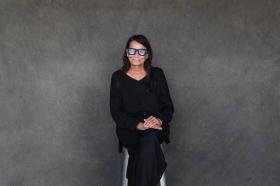When commissioned to write a play about the American Revolution, prolific US theatrical dynamo Lynn Nottage chose to write about a new kind of revolution she saw playing out in the country’s rural hinterlands in Sweat.
The decision was prompted by an email from a friend in dire straits who, after losing the job she’d held all her adult life, was broken. Nottage decided to explore the effects of economic stagnation on identity and community. She headed to Reading, in the famous Rust Belt. Once an industrial powerhouse, by the early 2000s Reading had the accolade of having the highest levels of poverty of any small city in the US. Nottage and her team conducted extensive interviews with residents about their experiences of economic deprivation. Sweat is based on those stories.
The play is set in a fictional city bar, the backbone of the local community, where workers from the steel factory come to sink a cold Budweiser after a hard day’s work. There’s a sculpture of an American bald eagle hanging on the wall and a jukebox in the corner.
Three long-term regulars, Tracey (Lisa McCune), Cynthia (Paula Arundell) and Jessie (Deborah Galanos) are at the bar to celebrate Tracey’s birthday. They dance, get drunk, flirt with the barman and discuss their relationships. The banter is light-hearted, but there’s also a premonition of what’s to come. Since losing his job at the local textile factory, Cynthia’s dope of an ex-husband Brucie (Markus Hamilton) has turned to drugs and booze. Bartender Stan (Yure Covich) says he’s heard of a worker who torched his house when he heard rumour of redundancies.
The steel factory bosses want to cut pay and the workers naively think that protest and pickets will lead them to capitulate like they have always done in the past and that life will return to a halcyon normal. Only these days things seem different. As Stan says, one day the line is going to thin out, and then what? There’s a queue of Latinos eager and ready to do their jobs for half the pay and globalisation means that the factory machines can be stripped and exported overnight to places where labour is cheap.
The factory is as much an identity for its workers as a source of income. Jobs have been passed down through generations of family. So, as the redundancies become a reality, and lack of income starts to pinch, community cohesion starts to fracture. Tensions and divisions emerge.
The majority white workforce blame outsiders for their predicament. African-American Cynthia, now promoted to supervisor, is seen as being ‘one of them’ rather than ‘one of us’, and Colombian bar worker, Oscar, becomes a target for slurs about foreigners taking white folks’ jobs.
By Jessie’s birthday, the jobs are gone and the future is bleak…
Director Zindzi Okenyo deploys none of the technical gimmicks that seem to have dominated many recent theatrical productions. There are no digital screens or technical wizardry. She bravely deploys a traditional fourth wall, playing the reality card full force. The design by Jeremy Allen and lighting by Verity Hampson echo this simple approach. There’s just one set – the bar and its clichéd paraphernalia, lit by muted table lamps. The effect is to create a sense of claustrophobia, not letting us escape from the reality and brutal events that unfold within its walls.
McCune, Arundell and Galanos all shine in their roles. Arendell in particular captivates our attention from the get-go, dominating the stage with an absorbing presence from beginning to end. McCune gives a solid performance as the sassy, hard-nosed Tracey. Galanos presents a tragic Jessie, slurring her way through a drunken barrage against everything. Covich, as Stan, forewarns the future in a subtle yet compelling performance.
When it premiered off-Broadway the year before Donald Trump came to power, Sweat seemed a premonition of why the Rust Belt turned Republican. The Sydney opening appears a timely reminder of the failure of Democratic politics to seize back its heartlands. And yet, the STC production sometimes feels more preachy than precocious. The play is relentlessly bleak and needs pacing to sustain momentum.
Read: Performance review: The Wharf Revue: The End of the Wharf As We Know It, Seymour Centre
Sweat lags at times, stifling a build in tension, so when the action comes to its grim conclusion, the pathos is muted. As the production comes into its stride these teething issues will no doubt iron out. There’s certainly enough talent in the writing and on stage to make that happen.
Sweat by Lynn Nottage
Sydney Theatre Company
Wharf 1 Theatre
Director: Zindzi Okenyo
Designer: Jeremy Allen
Lighting Designer: Verity Hampson
Composer and Sound Designer: Brendon Boney
Associate Director: Ian Michael
Consent Consultant and Intimacy Coordinator: Bayley Turner
Dialect Coach: Rachel Finley
Cast: Lisa McCune, Paula Arundell, Deborah Galanos, Yure Covich, Gabriel Alvarado, Markus Hamilton, James Fraser, Tinashe Mangwana
Sweat will be performed until 22 December 2024.





